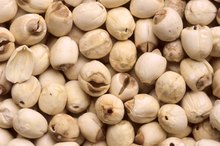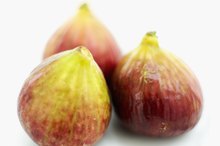Weight Loss and Red Kidney Beans
Red kidney beans are a good source of fiber, folate, magnesium, phosphorus, manganese, iron, copper and potassium. Eating beans, including kidney beans, more often may help reduce your risk for heart disease, cancer and diabetes, according to North Dakota State University Extension, and may also help you lose weight. This may be due to the fiber and protein they contain.
Fiber and Weight Loss
Women who consumed more fiber were less likely to gain weight than those who consumed less fiber in a study published in March 2009 in the "Journal of Nutrition." Fiber-rich foods are low in energy density, so they take up a lot of space in your stomach without providing a lot of calories. Foods containing soluble fiber also slow the emptying of your stomach, so you feel full longer. Red kidney beans are an excellent source of fiber, providing 16.5 grams, or 66 percent of the daily value, in each cup.
Protein and Weight Loss
List of Roughage Foods
Learn More
Red kidney beans are also a good source of protein, with 16.2 grams per cup. Protein is more filling than either carbohydrates or fat. The increased satiety experienced after eating protein-rich foods, such as kidney beans, may help you eat fewer calories throughout the day, helping to promote weight loss.
Beans and Weight Loss
People who eat beans are less likely to have obesity and more likely to have a smaller waist and lower body weight than people who don't eat beans, according to a study published in the "Journal of the American College of Nutrition" in October 2008. Another study, published in the "European Journal of Nutrition" in February 2011, found that people who ate four servings of beans per week as part of a low-calorie diet lost more weight and had greater improvements in inflammation, blood pressure and cholesterol levels than those who followed a low-calorie diet that didn't include beans.
Beans Compared to Other Protein Sources
Side Effects of Pinto Beans
Learn More
A low-calorie diet high in legumes, such as kidney beans, is just as effective for weight loss as a low-calorie, high-protein diet and more effective than a low-calorie diet high in fatty fish, according to a study published in the "Journal of Medicinal Food" in February 2009. The legume diet was also associated with greater reductions in cholesterol levels than the other diets, making it a healthier diet overall.
Adding Kidney Beans to Your Diet
Use kidney beans in place of other foods higher in fat, calories and energy density. For example, replace half or all of the meat in your favorite chili recipe with kidney beans, add kidney beans to vegetable soup instead of chicken or beef or add these nutritious beans to your favorite salad to give it a protein boost.
Related Articles
References
- Health-Alicious-Ness.com: Nutrition Facts Comparison Tool
- Journal of Nutrition: Increasing Total Fiber Intake Reduces Risk of Weight and Fat Gains in Women
- American Journal of Clinical Nutrition: Protein, Weight Management, and Satiety
- North Dakota State University Extension: All About Beans
- Journal of Medicinal Food: Legume-, Fish-, or High-Protein-Based Hypocaloric Diets: Effects on Weight Loss and Mitochondrial Oxidation in Obese Men
- European Journal of Nutrition: A Legume-Based Hypocaloric Diet Reduces Proinflammatory Status and Improves Metabolic Features in Overweight/Obese Subjects
- Journal of the American College of Nutrition: Bean Consumption Is Associated With Greater Nutrient Intake, Reduced Systolic Blood Pressure, Lower Body Weight, and a Smaller Waist Circumference in Adults: Results From the National Health and Nutrition Examination Survey 1999-2002
Writer Bio
Based in Massachusetts, Jessica Bruso has been writing since 2008. She holds a master of science degree in food policy and applied nutrition and a bachelor of arts degree in international relations, both from Tufts University.









